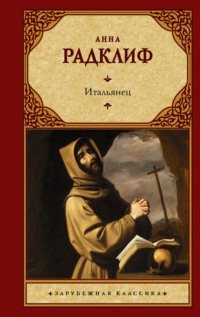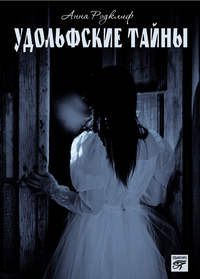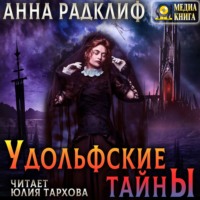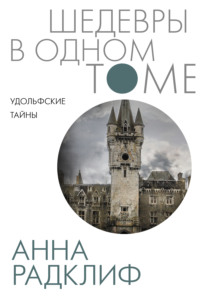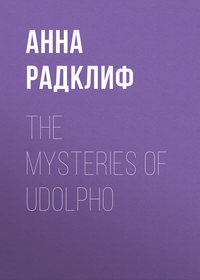
Полная версия
The Mysteries of Udolpho
St. Aubert looked, and perceived that it was the snowy summit of a mountain, so much higher than any around it, that it still reflected the sun's rays, while those below lay in deep shade.
At length, the village lights were seen to twinkle through the dusk, and, soon after, some cottages were discovered in the valley, or rather were seen by reflection in the stream, on whose margin they stood, and which still gleamed with the evening light.
The stranger now came up, and St. Aubert, on further enquiry, found not only that there was no inn in the place, but not any sort of house of public reception. The stranger, however, offered to walk on, and enquire for a cottage to accommodate them; for which further civility St. Aubert returned his thanks, and said, that, as the village was so near, he would alight, and walk with him. Emily followed slowly in the carriage.
On the way, St. Aubert asked his companion what success he had had in the chase. “Not much, sir,” he replied, “nor do I aim at it. I am pleased with the country, and mean to saunter away a few weeks among its scenes. My dogs I take with me more for companionship than for game. This dress, too, gives me an ostensible business, and procures me that respect from the people, which would, perhaps, be refused to a lonely stranger, who had no visible motive for coming among them.”
“I admire your taste,” said St. Aubert, “and, if I was a younger man, should like to pass a few weeks in your way exceedingly. I, too, am a wanderer, but neither my plan nor pursuits are exactly like yours – I go in search of health, as much as of amusement.” St. Aubert sighed, and paused; and then, seeming to recollect himself, he resumed: “If I can hear of a tolerable road, that shall afford decent accommodation, it is my intention to pass into Rousillon, and along the sea-shore to Languedoc. You, sir, seem to be acquainted with the country, and can, perhaps, give me information on the subject.”
The stranger said, that what information he could give was entirely at his service; and then mentioned a road rather more to the east, which led to a town, whence it would be easy to proceed into Rousillon.
They now arrived at the village, and commenced their search for a cottage, that would afford a night's lodging. In several, which they entered, ignorance, poverty, and mirth seemed equally to prevail; and the owners eyed St. Aubert with a mixture of curiosity and timidity. Nothing like a bed could be found, and he had ceased to enquire for one, when Emily joined him, who observed the languor of her father's countenance, and lamented, that he had taken a road so ill provided with the comforts necessary for an invalid. Other cottages, which they examined, seemed somewhat less savage than the former, consisting of two rooms, if such they could be called; the first of these occupied by mules and pigs, the second by the family, which generally consisted of six or eight children, with their parents, who slept on beds of skins and dried beech leaves, spread upon a mud floor. Here, light was admitted, and smoke discharged, through an aperture in the roof; and here the scent of spirits (for the travelling smugglers, who haunted the Pyrenees, had made this rude people familiar with the use of liquors) was generally perceptible enough. Emily turned from such scenes, and looked at her father with anxious tenderness, which the young stranger seemed to observe; for, drawing St. Aubert aside, he made him an offer of his own bed. “It is a decent one,” said he, “when compared with what we have just seen, yet such as in other circumstances I should be ashamed to offer you.” St. Aubert acknowledged how much he felt himself obliged by this kindness, but refused to accept it, till the young stranger would take no denial. “Do not give me the pain of knowing, sir,” said he, “that an invalid, like you, lies on hard skins, while I sleep in a bed. Besides, sir, your refusal wounds my pride; I must believe you think my offer unworthy your acceptance. Let me show you the way. I have no doubt my landlady can accommodate this young lady also.”
St. Aubert at length consented, that, if this could be done, he would accept his kindness, though he felt rather surprised, that the stranger had proved himself so deficient in gallantry, as to administer to the repose of an infirm man, rather than to that of a very lovely young woman, for he had not once offered the room for Emily. But she thought not of herself, and the animated smile she gave him, told how much she felt herself obliged for the preference of her father.
On their way, the stranger, whose name was Valancourt, stepped on first to speak to his hostess, and she came out to welcome St. Aubert into a cottage, much superior to any he had seen. This good woman seemed very willing to accommodate the strangers, who were soon compelled to accept the only two beds in the place. Eggs and milk were the only food the cottage afforded; but against scarcity of provisions St. Aubert had provided, and he requested Valancourt to stay, and partake with him of less homely fare; an invitation, which was readily accepted, and they passed an hour in intelligent conversation. St. Aubert was much pleased with the manly frankness, simplicity, and keen susceptibility to the grandeur of nature, which his new acquaintance discovered; and, indeed, he had often been heard to say, that, without a certain simplicity of heart, this taste could not exist in any strong degree.
The conversation was interrupted by a violent uproar without, in which the voice of the muleteer was heard above every other sound. Valancourt started from his seat, and went to enquire the occasion; but the dispute continued so long afterwards, that St. Aubert went himself, and found Michael quarrelling with the hostess, because she had refused to let his mules lie in a little room where he and three of her sons were to pass the night. The place was wretched enough, but there was no other for these people to sleep in; and, with somewhat more of delicacy than was usual among the inhabitants of this wild tract of country, she persisted in refusing to let the animals have the same bed-chamber with her children. This was a tender point with the muleteer; his honour was wounded when his mules were treated with disrespect, and he would have received a blow, perhaps, with more meekness. He declared that his beasts were as honest beasts, and as good beasts, as any in the whole province; and that they had a right to be well treated wherever they went. “They are as harmless as lambs,” said he, “if people don't affront them. I never knew them behave themselves amiss above once or twice in my life, and then they had good reason for doing so. Once, indeed, they kicked at a boy's leg that lay asleep in the stable, and broke it; but I told them they were out there, and by St. Anthony! I believe they understood me, for they never did so again.”
He concluded this eloquent harangue with protesting, that they should share with him, go where he would.
The dispute was at length settled by Valancourt, who drew the hostess aside, and desired she would let the muleteer and his beasts have the place in question to themselves, while her sons should have the bed of skins designed for him, for that he would wrap himself in his cloak, and sleep on the bench by the cottage door. But this she thought it her duty to oppose, and she felt it to be her inclination to disappoint the muleteer. Valancourt, however, was positive, and the tedious affair was at length settled.
It was late when St. Aubert and Emily retired to their rooms, and Valancourt to his station at the door, which, at this mild season, he preferred to a close cabin and a bed of skins. St. Aubert was somewhat surprised to find in his room volumes of Homer, Horace, and Petrarch; but the name of Valancourt, written in them, told him to whom they belonged.
Chapter IV
In truth he was a strange and wayward wight,Fond of each gentle, and each dreadful scene,In darkness, and in storm he found delight;Nor less than when on ocean-wave sereneThe southern sun diffus'd his dazzling sheen.Even sad vicissitude amus'd his soul;And if a sigh would sometimes intervene,And down his cheek a tear of pity roll,A sigh, a tear, so sweet, he wish'd not to control.THE MINSTRELSt. Aubert awoke at an early hour, refreshed by sleep, and desirous to set forward. He invited the stranger to breakfast with him; and, talking again of the road, Valancourt said, that, some months past, he had travelled as far as Beaujeu, which was a town of some consequence on the way to Rousillon. He recommended it to St. Aubert to take that route, and the latter determined to do so.
“The road from this hamlet,” said Valancourt, “and that to Beaujeu, part at the distance of about a league and a half from hence; if you will give me leave, I will direct your muleteer so far. I must wander somewhere, and your company would make this a pleasanter ramble than any other I could take.”
St. Aubert thankfully accepted his offer, and they set out together, the young stranger on foot, for he refused the invitation of St. Aubert to take a seat in his little carriage.
The road wound along the feet of the mountains through a pastoral valley, bright with verdure, and varied with groves of dwarf oak, beech and sycamore, under whose branches herds of cattle reposed. The mountain-ash too, and the weeping birch, often threw their pendant foliage over the steeps above, where the scanty soil scarcely concealed their roots, and where their light branches waved to every breeze that fluttered from the mountains.
The travellers were frequently met at this early hour, for the sun had not yet risen upon the valley, by shepherds driving immense flocks from their folds to feed upon the hills. St. Aubert had set out thus early, not only that he might enjoy the first appearance of sunrise, but that he might inhale the first pure breath of morning, which above all things is refreshing to the spirits of the invalid. In these regions it was particularly so, where an abundance of wild flowers and aromatic herbs breathed forth their essence on the air.
The dawn, which softened the scenery with its peculiar grey tint, now dispersed, and Emily watched the progress of the day, first trembling on the tops of the highest cliffs, then touching them with splendid light, while their sides and the vale below were still wrapt in dewy mist. Meanwhile, the sullen grey of the eastern clouds began to blush, then to redden, and then to glow with a thousand colours, till the golden light darted over all the air, touched the lower points of the mountain's brow, and glanced in long sloping beams upon the valley and its stream. All nature seemed to have awakened from death into life; the spirit of St. Aubert was renovated. His heart was full; he wept, and his thoughts ascended to the Great Creator.
Emily wished to trip along the turf, so green and bright with dew, and to taste the full delight of that liberty, which the izard seemed to enjoy as he bounded along the brow of the cliffs; while Valancourt often stopped to speak with the travellers, and with social feeling to point out to them the peculiar objects of his admiration. St. Aubert was pleased with him: “Here is the real ingenuousness and ardour of youth,” said he to himself; “this young man has never been at Paris.”
He was sorry when they came to the spot where the roads parted, and his heart took a more affectionate leave of him than is usual after so short an acquaintance. Valancourt talked long by the side of the carriage; seemed more than once to be going, but still lingered, and appeared to search anxiously for topics of conversation to account for his delay. At length he took leave. As he went, St. Aubert observed him look with an earnest and pensive eye at Emily, who bowed to him with a countenance full of timid sweetness, while the carriage drove on. St. Aubert, for whatever reason, soon after looked from the window, and saw Valancourt standing upon the bank of the road, resting on his pike with folded arms, and following the carriage with his eyes. He waved his hand, and Valancourt, seeming to awake from his reverie, returned the salute, and started away.
The aspect of the country now began to change, and the travellers soon found themselves among mountains covered from their base nearly to their summits with forests of gloomy pine, except where a rock of granite shot up from the vale, and lost its snowy top in the clouds. The rivulet, which had hitherto accompanied them, now expanded into a river; and, flowing deeply and silently along, reflected, as in a mirror, the blackness of the impending shades. Sometimes a cliff was seen lifting its bold head above the woods and the vapours, that floated mid-way down the mountains; and sometimes a face of perpendicular marble rose from the water's edge, over which the larch threw his gigantic arms, here scathed with lightning, and there floating in luxuriant foliage.
They continued to travel over a rough and unfrequented road, seeing now and then at a distance the solitary shepherd, with his dog, stalking along the valley, and hearing only the dashing of torrents, which the woods concealed from the eye, the long sullen murmur of the breeze, as it swept over the pines, or the notes of the eagle and the vulture, which were seen towering round the beetling cliff.
Often, as the carriage moved slowly over uneven ground, St. Aubert alighted, and amused himself with examining the curious plants that grew on the banks of the road, and with which these regions abound; while Emily, wrapt in high enthusiasm, wandered away under the shades, listening in deep silence to the lonely murmur of the woods.
Neither village nor hamlet was seen for many leagues; the goat-herd's or the hunter's cabin, perched among the cliffs of the rocks, were the only human habitations that appeared.
The travellers again took their dinner in the open air, on a pleasant spot in the valley, under the spreading shade of cedars; and then set forward towards Beaujeu.
The road now began to descend, and, leaving the pine forests behind, wound among rocky precipices. The evening twilight again fell over the scene, and the travellers were ignorant how far they might yet be from Beaujeu. St. Aubert, however, conjectured that the distance could not be very great, and comforted himself with the prospect of travelling on a more frequented road after reaching that town, where he designed to pass the night. Mingled woods, and rocks, and heathy mountains were now seen obscurely through the dusk; but soon even these imperfect images faded in darkness. Michael proceeded with caution, for he could scarcely distinguish the road; his mules, however, seemed to have more sagacity, and their steps were sure.
On turning the angle of a mountain, a light appeared at a distance, that illumined the rocks, and the horizon to a great extent. It was evidently a large fire, but whether accidental, or otherwise, there were no means of knowing. St. Aubert thought it was probably kindled by some of the numerous banditti, that infested the Pyrenees, and he became watchful and anxious to know whether the road passed near this fire. He had arms with him, which, on an emergency, might afford some protection, though certainly a very unequal one, against a band of robbers, so desperate too as those usually were who haunted these wild regions. While many reflections rose upon his mind, he heard a voice shouting from the road behind, and ordering the muleteer to stop. St. Aubert bade him proceed as fast as possible; but either Michael, or his mules were obstinate, for they did not quit the old pace. Horses' feet were now heard; a man rode up to the carriage, still ordering the driver to stop; and St. Aubert, who could no longer doubt his purpose, was with difficulty able to prepare a pistol for his defence, when his hand was upon the door of the chaise. The man staggered on his horse, the report of the pistol was followed by a groan, and St. Aubert's horror may be imagined, when in the next instant he thought he heard the faint voice of Valancourt. He now himself bade the muleteer stop; and, pronouncing the name of Valancourt, was answered in a voice, that no longer suffered him to doubt. St. Aubert, who instantly alighted and went to his assistance, found him still sitting on his horse, but bleeding profusely, and appearing to be in great pain, though he endeavoured to soften the terror of St. Aubert by assurances that he was not materially hurt, the wound being only in his arm. St. Aubert, with the muleteer, assisted him to dismount, and he sat down on the bank of the road, where St. Aubert tried to bind up his arm, but his hands trembled so excessively that he could not accomplish it; and, Michael being now gone in pursuit of the horse, which, on being disengaged from his rider, had galloped off, he called Emily to his assistance. Receiving no answer, he went to the carriage, and found her sunk on the seat in a fainting fit. Between the distress of this circumstance and that of leaving Valancourt bleeding, he scarcely knew what he did; he endeavoured, however, to raise her, and called to Michael to fetch water from the rivulet that flowed by the road, but Michael was gone beyond the reach of his voice. Valancourt, who heard these calls, and also the repeated name of Emily, instantly understood the subject of his distress; and, almost forgetting his own condition, he hastened to her relief. She was reviving when he reached the carriage; and then, understanding that anxiety for him had occasioned her indisposition, he assured her, in a voice that trembled, but not from anguish, that his wound was of no consequence. While he said this St. Aubert turned round, and perceiving that he was still bleeding, the subject of his alarm changed again, and he hastily formed some handkerchiefs into a bandage. This stopped the effusion of the blood; but St. Aubert, dreading the consequence of the wound, enquired repeatedly how far they were from Beaujeu; when, learning that it was at two leagues' distance, his distress increased, since he knew not how Valancourt, in his present state, would bear the motion of the carriage, and perceived that he was already faint from loss of blood. When he mentioned the subject of his anxiety, Valancourt entreated that he would not suffer himself to be thus alarmed on his account, for that he had no doubt he should be able to support himself very well; and then he talked of the accident as a slight one. The muleteer being now returned with Valancourt's horse, assisted him into the chaise; and, as Emily was now revived, they moved slowly on towards Beaujeu.
St. Aubert, when he had recovered from the terror occasioned him by this accident, expressed surprise on seeing Valancourt, who explained his unexpected appearance by saying, “You, sir, renewed my taste for society; when you had left the hamlet, it did indeed appear a solitude. I determined, therefore, since my object was merely amusement, to change the scene; and I took this road, because I knew it led through a more romantic tract of mountains than the spot I have left. Besides,” added he, hesitating for an instant, “I will own, and why should I not? that I had some hope of overtaking you.”
“And I have made you a very unexpected return for the compliment,” said St. Aubert, who lamented again the rashness which had produced the accident, and explained the cause of his late alarm. But Valancourt seemed anxious only to remove from the minds of his companions every unpleasant feeling relative to himself; and, for that purpose, still struggled against a sense of pain, and tried to converse with gaiety. Emily meanwhile was silent, except when Valancourt particularly addressed her, and there was at those times a tremulous tone in his voice that spoke much.
They were now so near the fire, which had long flamed at a distance on the blackness of night, that it gleamed upon the road, and they could distinguish figures moving about the blaze. The way winding still nearer, they perceived in the valley one of those numerous bands of gipsies, which at that period particularly haunted the wilds of the Pyrenees, and lived partly by plundering the traveller. Emily looked with some degree of terror on the savage countenances of these people, shown by the fire, which heightened the romantic effects of the scenery, as it threw a red dusky gleam upon the rocks and on the foliage of the trees, leaving heavy masses of shade and regions of obscurity, which the eye feared to penetrate.
They were preparing their supper; a large pot stood by the fire, over which several figures were busy. The blaze discovered a rude kind of tent, round which many children and dogs were playing, and the whole formed a picture highly grotesque. The travellers saw plainly their danger. Valancourt was silent, but laid his hand on one of St. Aubert's pistols; St. Aubert drew forth another, and Michael was ordered to proceed as fast as possible. They passed the place, however, without being attacked; the rovers being probably unprepared for the opportunity, and too busy about their supper to feel much interest, at the moment, in anything besides.
After a league and a half more, passed in darkness, the travellers arrived at Beaujeu, and drove up to the only inn the place afforded; which, though superior to any they had seen since they entered the mountains, was bad enough.
The surgeon of the town was immediately sent for, if a surgeon he could be called, who prescribed for horses as well as for men, and shaved faces at least as dexterously as he set bones. After examining Valancourt's arm, and perceiving that the bullet had passed through the flesh without touching the bone, he dressed it, and left him with a solemn prescription of quiet, which his patient was not inclined to obey. The delight of ease had now succeeded to pain; for ease may be allowed to assume a positive quality when contrasted with anguish; and, his spirits thus reanimated, he wished to partake of the conversation of St. Aubert and Emily, who, released from so many apprehensions, were uncommonly cheerful. Late as it was, however, St. Aubert was obliged to go out with the landlord to buy meat for supper; and Emily, who, during this interval, had been absent as long as she could, upon excuses of looking to their accommodation, which she found rather better than she expected, was compelled to return, and converse with Valancourt alone. They talked of the character of the scenes they had passed, of the natural history of the country, of poetry, and of St. Aubert; a subject on which Emily always spoke and listened to with peculiar pleasure.
The travellers passed an agreeable evening; but St. Aubert was fatigued with his journey; and, as Valancourt seemed again sensible of pain, they separated soon after supper.
In the morning St. Aubert found that Valancourt had passed a restless night; that he was feverish, and his wound very painful. The surgeon, when he dressed it, advised him to remain quietly at Beaujeu; advice which was too reasonable to be rejected. St. Aubert, however, had no favourable opinion of this practitioner, and was anxious to commit Valancourt into more skilful hands; but learning, upon enquiry, that there was no town within several leagues which seemed more likely to afford better advice, he altered the plan of his journey, and determined to await the recovery of Valancourt, who, with somewhat more ceremony than sincerity, made many objections to this delay.
By order of his surgeon, Valancourt did not go out of the house that day; but St. Aubert and Emily surveyed with delight the environs of the town, situated at the feet of the Pyrenean Alps, that rose, some in abrupt precipices, and others swelling with woods of cedar, fir, and cypress, which stretched nearly to their highest summits. The cheerful green of the beech and mountain-ash was sometimes seen, like a gleam of light, amidst the dark verdure of the forest; and sometimes a torrent poured its sparkling flood, high among the woods.
Valancourt's indisposition detained the travellers at Beaujeu several days, during which interval St. Aubert had observed his disposition and his talents with the philosophic inquiry so natural to him. He saw a frank and generous nature, full of ardour, highly susceptible of whatever is grand and beautiful, but impetuous, wild, and somewhat romantic. Valancourt had known little of the world. His perceptions were clear, and his feelings just; his indignation of an unworthy, or his admiration of a generous action, were expressed in terms of equal vehemence. St. Aubert sometimes smiled at his warmth, but seldom checked it, and often repeated to himself, “This young man has never been at Paris.” A sigh sometimes followed this silent ejaculation. He determined not to leave Valancourt till he should be perfectly recovered; and, as he was now well enough to travel, though not able to manage his horse, St. Aubert invited him to accompany him for a few days in the carriage. This he the more readily did, since he had discovered that Valancourt was of a family of the same name in Gascony, with whose respectability he was well acquainted. The latter accepted the offer with great pleasure, and they again set forward among these romantic wilds about Rousillon.


